|
|
|
Sort Order |
|
|
|
Items / Page
|
|
|
|
|
|
|
| Srl | Item |
| 1 |
ID:
103234
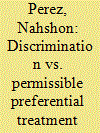

|
|
|
|
|
| Publication |
2011.
|
| Summary/Abstract |
This essay analyzes the allocation policies enacted by Haifa University over its dormitories. While seemingly a trivial case, it is actually a key example of an ongoing legal and social struggle between Arab and Jewish citizens of Israel. The policy provides preferential treatment for veterans of IDF and national service. Adalah challenged this policy in an Israeli court which accepted the petition. However, the legislation was later changed to allow such preferential treatment. This article examines two issues: national service for Arabs, and the preferential treatment practised by Haifa University I will argue that both opening national service for Arabs, and the policy of Haifa University are justified, however, the analysis will demonstrate the complexity of both subjects, and the article concludes with suggestions for both issues.
|
|
|
|
|
|
|
|
|
|
|
|
|
|
|
|
| 2 |
ID:
103229
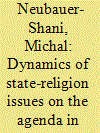

|
|
|
|
|
| Publication |
2011.
|
| Summary/Abstract |
The continuous threat to the existence of the state of Israel is reflected in a rigid agenda, causing extremely stiff competition for attention. Nevertheless, the question of the relationship between state and religion manages to be placed high on the agenda. By focusing on the case study of euthanasia during the 14th Knesset headed by Benjamin Netanyahu and the 15th Knesset headed by Ehud Barak, this article proposes an explanation that is applicable to Israel's socio-political context regarding the positioning of issues concerning state and religion on the policy-makers' agenda.
|
|
|
|
|
|
|
|
|
|
|
|
|
|
|
|
| 3 |
ID:
103230
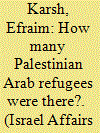

|
|
|
|
|
| Publication |
2011.
|
| Summary/Abstract |
The number of Palestinian Arabs fleeing their homes during the 1948 war has constituted one of the most intractable bones of contention of the Arab-Israeli conflict, not least since the Palestinians have insisted on the 'right of return' of these individuals and their descendants to territory that has long been part of the state of Israel. At the end of the war, the Israeli government set the number of Palestinian refugees at 550,000-600,000; the British Foreign Office leaned toward the higher end of this estimate. But within a year, as large masses of people sought to benefit from the unprecedented influx of international funds to the area, some 962,000 alleged refugees had been registered with the newly-established UN Relief and Works Agency (UNRWA). More than a half-century later, these exaggerated initial numbers have swollen still further: as of June 2000, according to UNRWA, the total had climbed close to 3.75 million, though it readily admits that the statistics are largely inflated. For its part the PLO set a still higher figure of 5 million refugees, while Israel has unofficially estimated the current number of refugees and their families at closer to 2 million. Using a wealth of declassified Arab, Israeli, and British documents, this article seeks to provide as comprehensive and accurate an estimate as possible of the actual number of refugees in the wake of the 1948 war.
|
|
|
|
|
|
|
|
|
|
|
|
|
|
|
|
| 4 |
ID:
103232


|
|
|
|
|
| Publication |
2011.
|
| Summary/Abstract |
The article begins by discussing various criteria considered by different authors as indicators of the onset of a civil war, such as the number of combat deaths and the duration of the war. It then examines whether the Hamas-Fatah conflict can be considered a civil war, before assessing the impact of this conflict on the Palestinians and exploring its implications for the wider Arab-Israeli conflict. The article further investigates the reverberations of this conflict at the regional level and appraises its future course in terms of optimistic versus pessimistic views.
|
|
|
|
|
|
|
|
|
|
|
|
|
|
|
|
| 5 |
ID:
103225
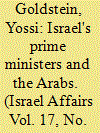

|
|
|
|
|
| Publication |
2011.
|
| Summary/Abstract |
This article identifies similar patterns of behaviour and attitudes towards Arabs and the Arab states among three of Israel's prime ministers in the first 10 years that followed the 1967 war: Levi Eshkol, Golda Meir, and Yitzhak Rabin. All three believed in the right of the Jews to the Land of Israel, in their right to return to their ancient homeland to become a majority, and in the establishment of the state of Israel as the national home of the Jewish people - a state founded on values of democracy and equal of rights for all its citizens. Convinced that the Arabs would never reconcile themselves to Jewish sovereignty in (however small) a part of the Middle East, they believed that Israel must rely on its sword if it were to survive. They differed, nevertheless, over how to achieve these goals. While Eshkol and Rabin believed that Israel should withdraw from most of the territories captured in the 1967 War as a condition for partial (Rabin) or full (Eshkol) peace, Meir did not share this view.
|
|
|
|
|
|
|
|
|
|
|
|
|
|
|
|
| 6 |
ID:
103227
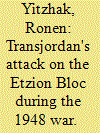

|
|
|
|
|
| Publication |
2011.
|
| Summary/Abstract |
The assault by Transjordan's Arab Legion on the Etzion Bloc (Gush Etzion), a cluster of Jewish villages north of the Biblical town of Hebron, from 4-14 May 1948, before the termination of the British Mandate, constituted an important milestone in the overall Arab strategy to prevent the emergence of the independent state of Israel in accordance with the UN Partition Resolution of 29 November 1947. The timing and manner of the attack were not coincidental but indicative of King Abdullah's political and military ambitions. They also tell of the reality of mandatory policy, as it was Britain that armed, trained, and led the Legion, and was obliged to protect the Jewish villages. In theory, the Etzion Bloc, like other Jewish neighbourhoods in the prospective Arab state, should have been able to live and prosper in peace. As it were, all were destroyed and their inhabitants expelled, in this case - after a large scale massacre of surrendered fighters.
|
|
|
|
|
|
|
|
|
|
|
|
|
|
|
|
| 7 |
ID:
103233
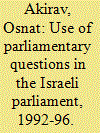

|
|
|
|
|
| Publication |
2011.
|
| Summary/Abstract |
This article examines the use of parliamentary questions in the Israeli parliament (Knesset) as a means of controlling the government during the years 1992-96 through an analysis of 1041 parliamentary questions on the basis of four criteria: efficiency (how long it takes to be answered); effectiveness (achieving its goals); the need for a supplementary question; and the publicity surrounding the minister's answer. It shows that although in the 13th Knesset the parliamentary question became a more efficient and effective parliamentary tool than in previous Knesset terms, its ability to serve as a means for controlling the government leaves much to be desired.
|
|
|
|
|
|
|
|
|
|
|
|
|
|
|
|
|
|
|
|
|